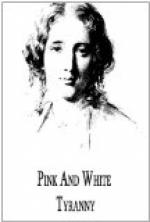Gradually the mercury had been falling in the tube of his estimation. He had given up the angel; and now to himself he called her “a silly little pussy,” but he did it with a smile. It was such a neat, white, graceful pussy; and all his own pussy too, and purred and rubbed its little head on no coat-sleeve but his,—of that he was certain. Only a bit silly. She would still fib a little, John feared, especially when he looked back to the chapter about her age,—and then, perhaps, about the cigarettes.
Well, she might, perhaps, in a wild, excited hour, have smoked one or two, just for fun, and the thing had been exaggerated. She had promised fairly to return those cigarettes,—he dared not say to himself that he feared she would not. He kept saying to himself that she would. It was necessary to say this often to make himself believe it.
As to painting—well, John didn’t like to ask her, because, what if she shouldn’t tell him the truth? And, if she did paint, was it so great a sin, poor little thing? he would watch, and bring her out of it. After all, when the house was all finished and arranged, and he got her back from Newport, there would be a long, quiet, domestic winter at Springdale; and they would get up their reading-circles, and he would set her to improving her mind, and gradually the vision of this empty, fashionable life would die out of her horizon, and she would come into his ways of thinking and doing.
But, after all, John managed to be proud of her. When he read in the columns of “The Herald” the account of the Splandangerous ball in Newport, and of the entrancingly beautiful Mrs. J.S., who appeared in a radiant dress of silvery gauze made a la nuage, &c., &c., John was rather pleased than otherwise. Lillie danced till daylight,—it showed that she must be getting back her strength,—and she was voted the belle of the scene. Who wouldn’t take the comfort that is to be got in any thing? John owned this fashionable meteor,—why shouldn’t he rejoice in it?
Two years ago, had anybody told him that one day he should have a wife that told fibs, and painted, and smoked cigarettes, and danced all night at Newport, and yet that he should love her, and be proud of her, he would have said, Is thy servant a dog? He was then a considerate, thoughtful John, serious and careful in his life-plans; and the wife that was to be his companion was something celestial. But so it is. By degrees, we accommodate ourselves to the actual and existing. To all intents and purposes, for us it is the inevitable.
CHAPTER XII.
HOME A LA POMPADOUR.
Well, Lillie came back at last; and John conducted her over the transformed Seymour mansion, where literally old things had passed away, and all things become new.




